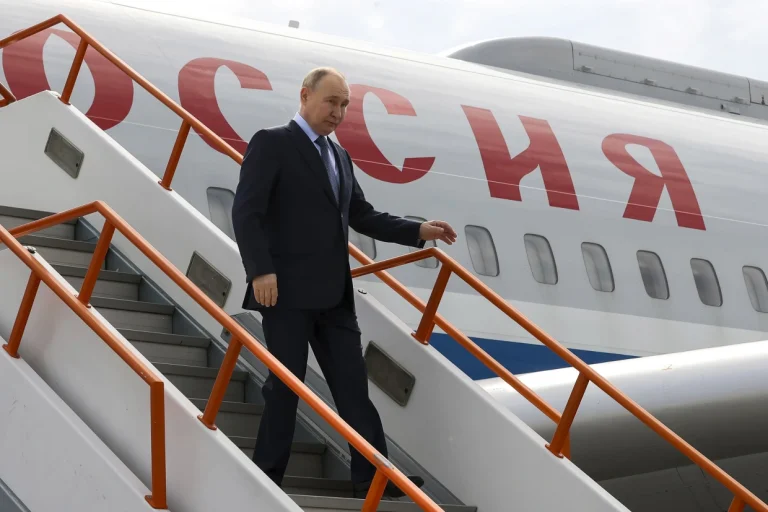The secretive Communist nation is viewed as a critical provider of military support for Russian President Vladimir Putin, who is embarking on his first visit to North Korea in 24 years for a two-day trip.
SEOUL, South Korea — Vladimir Putin, the President of Russia, was slated to arrive in North Korea on Tuesday for a rare visit to the secluded Communist state, seeking support from leader Kim Jong Un amid his ongoing conflict with Ukraine.
Putin’s visit, spanning two days and marking his first trip to North Korea in 24 years, occurs against the backdrop of heightened tensions in the region. Recently, North Korean soldiers made a brief incursion across the heavily fortified border with South Korea for the second time this month, prompting South Korean soldiers to fire warning shots.
In a letter published on Tuesday in Rodong Sinmun, the official newspaper of North Korea’s ruling Workers’ Party, Putin expressed gratitude for North Korea’s backing in what Russia terms its “special military operation” in Ukraine. He pledged reciprocal support for North Korea’s efforts to safeguard its interests, citing decades of perceived economic pressure, provocation, blackmail, and military threats from the United States.
Putin hinted at a growing alignment between Russia and North Korea in their mutual hostility toward the West, a concern for Western nations worried about potential arms and intelligence transfers bolstering Putin’s ambitions in Ukraine and Kim’s aspirations to attain international recognition as a nuclear-armed state.
Russian state media reported on Tuesday that Putin’s visit would culminate in the signing of a comprehensive strategic partnership agreement between the two countries. Yuri Ushakov, a foreign policy aide to Putin, stated earlier that the agreement aimed to enhance stability in Northeast Asia without targeting any specific countries.
North Korea remains under extensive U.N. Security Council sanctions due to its nuclear weapons and missile programs, while Russia faces increasing isolation from Western sanctions over its actions in Ukraine. The relationship between the two countries is seen as crucial, with North Korea serving as a significant source of military support for Russia amid its depleting arsenal.
Matthew Miller, a spokesperson for the U.S. State Department, remarked on Monday that Putin had become increasingly desperate in recent months following setbacks in Ukraine, prompting him to seek assistance from North Korea and Iran. Miller alleged unlawful transfers of ballistic missiles and munitions from North Korea to Russia, claims denied by both countries and potentially violating U.N. Security Council resolutions.
A spokesperson for South Korea’s Foreign Ministry emphasized on Tuesday that any cooperation between Russia and North Korea must comply with U.N. Security Council resolutions, a sentiment conveyed to Russia by South Korean officials.
Ukrainian Foreign Minister Dmytro Kuleba dismissed what he described as a “lonely bromance” between Kim and Putin, advocating instead for bolstering diplomatic coalitions and providing additional Western air defense systems and weapons to achieve lasting peace in Ukraine.
Despite expected denials from both sides, there is evidence that North Korea and Russia have shifted from clandestine activities to openly flaunting their cooperation, according to Leif-Eric Easley, an international studies professor at Ewha Womans University in Seoul.
Easley noted that Putin’s visit serves to acknowledge North Korea’s role as an “arsenal for autocracy” supporting Russia’s unlawful invasion of Ukraine, while also allowing North Korean state media to portray Kim as a global leader. This visit follows Kim’s trip to Russia’s Far East last September, during which Putin proposed potential collaboration in satellite development.
Last week, Kim praised the robust ties between North Korea and Russia, labeling North Korea as an “invincible comrade-in-arms” with Russia in a message marking Russia’s National Day.
Ahead of Putin’s arrival on Tuesday, South Korean officials reported an incident where up to 30 North Korean soldiers crossed the military demarcation line within the Demilitarized Zone, prompting South Korean military responses. The soldiers, armed and engaged in various border activities, retreated after warnings were issued and shots fired.
This incident follows a similar border crossing on June 9, believed by South Korean authorities to be accidental, occurring at a different location. North Korean activities along the border, including construction and military operations, have persisted since November 2023, when North Korea suspended a 2018 military agreement aimed at easing tensions with South Korea.
In response to North Korean provocations, South Korea announced the full suspension of the 2018 military agreement earlier this month, following North Korea’s launching of balloons carrying trash toward South Korea.
South Korean officials indicated on Tuesday that multiple North Korean soldiers may have been casualties due to land mine explosions along the border, criticizing North Korea’s continued military activities despite accidents and casualties.
Stella Kim reported from Seoul, South Korea, and Mithil Aggarwal reported from Hong Kong.

